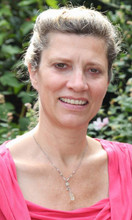 Loading... Please wait...
Loading... Please wait...Is Therapeutic Training Center Right For You?
Take The Free QuizCategories
Join Our Mailing List
2336.) Freeing the Axial Skeleton: Myofascial Balancing for Craniosacral Therapists (Seattle January 17-19, 2025)
Product Description
Instructor: Lauren Christman, LMT, CCST; NCBTMB #450788-08
Addressing the myofascial ‘hard frame’ is a natural complement to craniosacral work which focuses on subtle movements and physiological activity in the fluid body. This hard frame—the bone and myofascial architecture—creates the container for the fluids and organs. So any asymmetry in the architecture creates a limitation, grand or small, on the subtler levels.
The Method--Myofascial Balancing: In this class, we focus on the axial skeleton: pelvis, sacrum, spine, ribcage and head—the craniosacral 'neighborhood.' Our primary focus is assessment-driven myofascial work, which can be directed at deep or superficial layers as needed. The amount of force used can vary to be comfortable and specific to the restriction being addressed.
As with other osteopathic methods, the work is directional. We take tissue or bone into the pattern ("indirect") or immediately toward neutral ("direct"). Both strategies affect change—though they often feel different to the receiver. Direct work tends to feel more intense, which is satisfying to some; while indirect work tends to feel more gentle, which may be better for those with acute symptoms.
We frequently use the skeleton as a ‘handle’ for treatment and as a guide in evaluating alignment. Orienting to the bones allows us to apply "long-lever" techniques, creating change with client in standing. Because the work is non-lubricated, it can be done on skin, through a sheet or through clothes, and in varied positions. (No need to worry about draping!) This strategy allows us to combine the client’s awareness and active engagement, and much less force than when the client is on the table.
As a perfect complement to cranial work, we present strategies for decompressing the spinal facet joints. Releasing these joints brings a thoroughness to your work with the dural layers and the cranial sutures.
The work is designed to keep the loop between evaluation and treatment as short as possible. By consistently checking the state of the tissue, the practitioner remains well-oriented and therapeutic goals can be attained quickly. This style of tissue engagement is easily integrated with the mid-tide level of motility.
Areas of exploration and treatment
- Weight-bearing dynamics and common postural patterns
- Intrapelvic patterns: tilts, inflare, outflare and torsion
- Non-invasive fascial techniques for psoas, iliacus, diaphragm and QL
- Contribution of spinal dura to fascial strain patterns
- General as well as specific vertebra-by-vertebra alignment in the spine
- Rib cage shape and mobility, including diaphragm and mediastinum
- Decompressive technique for the anterior neck, appropriate for acute whiplash
- Mobility approach for the cranial dural layers
Throughout the course, we focus on the ways that gravity influences our hard frame. Posture and usage affect our shape, creating an architecture that is the nest and the ground for the central nervous system. Being able to clearly assess and effectively treat that architecture adds grounding and versatility to a craniosacral practice.
Prerequisite: The Craniosacral Introductory Workshop taught by Ursula Popp or Lauren Christman. If you have not taken the Craniosacral Introductory Workshop class, then you should have consistent skill in palpating motility (CRI or mid-tide). Please contact the teacher if you have questions about your readiness for the material: lauren@craftedtouch.com
Teacher Masking Policy: Masking is recommended, but is optional in this class, each person can choose to wear a mask, or not. For our masking policy and how to prepare for class, please click HERE.
What to Bring: A flat sheet, flower, writing utensils and a journal/notebook. Please wear loose clothing for ease of movement since we will be using the massage tables, chairs and the floor in our classroom for technique. Please leave everything not needed for class in your vehicle or at home. Use a large tote bag (think beach tote) or suitcase to contain your "what to bring items".
Travel Recommendation: If you are traveling by plane, train or long-distance bus to attend class, please click HERE to read our recommendations for traveling and attending class.
Deposits and Registration Options: Payments can be made to the Therapeutic Training Center by cash, check or credit card. A deposit of $100 may be made to guarantee a spot as long as full payment is made by the first day of class. To make a deposit on the class, please call 206.853.6875 to pay with a credit or debit card or follow the instructions for mailing in a registration by clicking on this link for the mail-in Registration Form and just follow the directions on the form. Unfortunately, the website will not handle partial payments so deposits cannot be made online.
Class Date: January 17-19, 2025
Class Times: Friday-Sunday 9:30 am - 5:30 pm
Location: Seattle Location 2 -- Staybridge Suites (please click on the link for location details)
Cost: $410
Cost/Hour: $19.52/hr
Hours: 21
Other Coursework by Instructor:
- Freeing the Axial Skeleton: Myofascial Balancing for Craniosacral Therapists (Seattle January 17-19, 2025) - 21 hours
- Craniosacral Introductory Workshop (Seattle February 21-23, 2025) - 21 hours
- Cranial Nerve Mobilization--Freeing the Tethers (Seattle March 28-30, 2025) - 21 hours
- Supporting the Brain – Concussion, Centralized Pain and Select Pathologies (Seattle April 2-4, 2025) - 21 hours
- Craniosacral Introductory Workshop (Seattle May 30-June 1, 2025) - 21 hours
- Unwinding the Birth Pattern: For Infants and Adults (Seattle June 27-29, 2025) - 21 hours
- Visceral Listening: Enhancing the Motility of the Organs (Seattle October 10-12, 2025) - 21 hours
Next Craniosacral Core Series & Certification Programs start on Nov 6, 2024.
(click HERE for details about Lauren Christman's Craniosacral Programs.)

